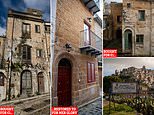
The lower ground floor looks like a bomb has gone off but the staircase seems firm. Going up floor by floor, I am told not to stray too close to the centre of each room for fear I might fall through.
In the little kitchen on the top floor, I find an old pot on an old stove. A faded photo of a child in an Edwardian sailor suit hangs on a wall, as does a yellowing calendar which suggests the last time anyone actually lived here: 1973.
Crucially, however, the roof seems to be in one piece as there is no indication of intruding rainwater.
There is no electricity and all plumbing was disconnected years ago.
Finally, we wrench open the door leading out on to the second-floor balcony and I immediately see the appeal of this place. In one direction you overlook an ancient bell tower and rooftops stretching out towards the Sicilian countryside. In the other, you look up a steep cobbled street that has not changed one jot in more than a century.
What this place lacks in basic amenities, it makes up for in that essential feature in any home: charm.
And it has just been snapped up for the asking price: one euro.
‘For years, this house has been doing nothing,’ says my guide, Giuseppe Catania. ‘Now, it will do something for this town.’
Dilapidated: But this will soon be an elegant town house. Giuseppe Catania is in the vanguard of a very modern idea to revitalise dormant pockets of rural Italy
Giuseppe is not an estate agent. He is the mayor of Mussomeli, a hill town that sits prettily in the middle of Sicily, beneath an Arab-Norman castle perched on a chunk of rock like a giant toadstool.
Yet Mussomeli is also in the vanguard of a very modern idea to revitalise dormant pockets of rural Italy — by flogging off ancient housing for less than a quid. And the results have been astonishing.
There are no restrictions on who can buy, nor any rules on how they can sell — beyond an obligation to start restoration within three years. However, as we shall see, there are plenty of hurdles on the long road from DIY to la dolce vita.
The real beneficiaries, though, are not the buyers but the residents of these towns. For they are seeing entire districts, which have sat in chronic disrepair for decades, come back to life. Employment is soaring and new shops and businesses are taking off.
In Mussomeli, reports of the one-euro homes led one Argentinian investor to explore opening a new engineering institute here. Pre-Covid, the town had 380 tourists. Last year there were 5,000 and numbers are shooting up.
Whereas it is a recurring complaint in much of rural Britain that wealthy weekenders price young locals out of the property market, no one is grumbling here. ‘People used to come knocking on my door asking about jobs, but they don’t come anymore!’ says Giuseppe.
What’s more, his town has a population of 10,000 but enough housing for 36,000, so the native population is not being forced out. The main problem is a shortage of builders.
Walking through one of the main piazzas, I stop in my tracks as I spot a large portrait of the Queen on a wall. ‘A local artist wanted to welcome the new nationalities living here — we have gone from just one to 18,’ says the mayor. ‘We thought the inglesi would like to see the Queen.’
Across the square, I meet ex-Londoner Danny McCubbin, who runs a community kitchen feeding clergy and care homes.
Now 58, he spent 17 years working for Jamie Oliver, helping the chef set up his Fifteen Foundation.
He read an article about one-euro homes in Sicily and decided to buy one, raising 25,000 euros to convert it into a charitable community food project. ‘I liked the fact that the whole process was very clear and transparent,’ says Australia-born Danny, who arrived in town just before the pandemic hit.
But his is a cautionary tale for Brits who imagine that they can simply acquire a European bolthole for the cost of an espresso.
Smart move: A house in Sambuca renovated by a U.S. couple. It’s another town keen to make the most of the transformative power of a few one-euro houses
Having bought his house wreck, he had to pay the registration and legal fees, which cost a couple of thousand euros on top.
The next hurdle was finding a builder. He had to wait for Covid to subside, but two problems then surfaced. The first was a new initiative by the Italian government offering people nationally a huge, time-sensitive bung: they can have a 110 per cent tax break if they can make their houses more energy-efficient by the end of this year.
As a result, the entire country has been chasing every last builder. Second, the price of building materials has soared by 25 per cent.
Danny soon realised that his budget was not going to cover the costs, so he cut his losses and sold his house (for one euro), losing about 3,000 euros. But he has no regrets since he has been offered better premises at a peppercorn rent, he has made loads of new friends and, having owned a home, he has acquired Italian residency.
Milton Keynes sales director Jose Ramos, 43, has a different tale. He bought two one-euro homes pre-Covid, has renovated one and is now well under way with another. It’s gone so well that he has bought two more as holiday homes.
He has a major advantage in speaking the language courtesy of his Italian mother: ‘I did some of the early building work myself and I was able to find workers by asking around.’
I also meet Tonia and Steve Brauer from California, where she worked in real estate, he in a Mercedes dealership. When Steve, 66, was diagnosed with Parkinson’s, they decided to seize every moment and, having read about the one-euro homes, went house-hunting.
A run-down property sold in Sambuca. The real beneficiaries, though, are not the buyers but the residents of these towns, writes Robert Hardman
Like many who have bought here, they were lured by the one-euro headlines but ended up buying something a little more comfortable (for every one-euro home sold, a further three are sold for more).
The Brauers paid 7,000 euros for a more practical partial wreck and spent a further 19,000 to make it inhabitable. Having since decided that they missed a few creature comforts, they sold up and are now renting in the newer part of town. But, again, they have no regrets and no plans to leave. ‘We have been made so welcome here and this mayor has lifted the whole town,’ says Tonia, 52.
So how does it work? And how do all these houses end up on the market? The idea was first aired by the mayor of another town, Salemi, some years ago (though it only took off in 2017). He argued that selling moribund housing for a pittance might kickstart a revival of hill towns, where there is a serious imbalance of old and young.
In many of them, families simply emigrated. Thousands moved to the UK in the 1960s in search of work (there is a big Mussomeli diaspora in Woking and Enfield).
Giuseppe, 52, a business consultant, says the council is simply acting as a broker. Attached to every crumbling home, there is usually a collection of siblings or cousins scattered around the globe who cannot agree what to do with it.
All the while, it attracts a property tax of several hundred euros per year, with an escalating 200 per cent fine when it is not paid. On top of that, if a property becomes a risk, the owners are liable. By which point these homes are worthless.
So the council now writes to the owners with an offer to sell the thing for a euro and be absolved of all obligations. Across Italy, dozens of small towns are doing the same, usually those that have a dynamic mayor. For this involves lots of work for Giuseppe and his deputy mayor, Toti Nigrelli, who, being fluent in English, is the first port of call for would-be expats.
An old, neglected kitchen. Attached to every crumbling home, there is usually a collection of siblings or cousins scattered around the globe who cannot agree what to do with it
No one seems to have any regrets. It’s the same story two hours away in the town of Sambuca, where a grand boulevard runs up the hill with a jumble of pretty cobbled alleys off to the sides.
It’s another town keen to make the most of the transformative power of a few one-euro houses.
The mayor of Sambuca, Leo Ciaccio, 50, sold a batch in 2019 and has put a second group on the market for two euros (when he does a third, they will go for three). However, those homes have triggered a surge in local property sales.
We bump into English-speaking notary, Anna Salerno, dashing between appointments with house buyers. ‘This town didn’t even have a notary before. Now they do — and they need one who speaks English!’ she laughs.
We meet Gullota Franco, 50, a metal craftsman. ‘I’ve never been busier,’ he tells me, adding that he has taken on three new workers to cope with the demand and that he loves the new buzz about the place.
In another part of town, Eli Halawani, 73, from Israel, tells us he is now the proud owner of a big two-euro house that went to auction. He put in a sealed bid of 4,000 euros and secured a sturdy, if very basic, four-room house attached to a complete wreck of a barn.
Eli plans to spend 50,000 euros to create a B&B.
‘I always say that one plus one equals three, because other things come along in life,’ he says, pointing to his new friends at the B&B where he is staying. He is so impressed by the olive oil they produce that he has just signed a deal to export it to Israel.
Mayor Ciaccio points out that a few years ago, the most frequent sign in town was ‘for sale’ but ‘now the signs say ‘B&B’.’ As we walk, a police car slows down for a chat. I ask about crime and the cops point out that they did make an arrest last week for burglary — though it was the first in two years.
‘The police are on holiday here,’ jokes Leo.
Rural idyll: In Mussomeli, reports of the one-euro homes led one Argentinian investor to explore opening a new engineering institute here
However much people may yearn for a sleepy town, he is adamant that youth and rejuvenation are essential: ‘Every year, a hundred old people die and one baby is born.’
Later, as we sit down amid a packed house in Molino Antica for a spread of ricotta with olive caponata, seafood ravioli and swordfish, Leo receives a call telling him he is on France’s biggest TV network right now.
He explains he was interviewed after Airbnb bought a one-euro home and spent 200,000 euros on a glossy makeover. The online giant has now invited global applicants to live in the house for free.
Actress Lorraine Bracco, star of The Sopranos, also restored a wreck here in Sambuca for a reality show. Leo says that barely a day goes by without a call from the media.
Everyone here stops for a chat. Over a glass of the excellent wine her family makes, Licia Cardillo Di Prima, author and editor of local paper La Voce Di Sambuca says everyone is proud of what is happening here.
‘It’s part of Sicily’s history that we welcome foreigners,’ she says. Surely her paper must have encountered some opposition to this scheme? ‘No!’ she says, wagging her finger. ‘It gives us all the opportunity to celebrate ourselves.’
Back in Mussomeli, Alexandra Stubbs, a Wiltshire entrepreneur, is still seeking a building contractor three years after buying her one-euro house. She has full technical plans for the place and is chronicling her experiences on her website, my1eurohouse.com.
However, she advises British buyers to think carefully. ‘I was one of the first to buy here but the double whammy of Covid and a shortage of builders has made it a very different proposition from the one I signed up for — though it’s still a great idea.’
Giuseppe Catania accepts that there will be glitches but overall, he says, the scheme has been a godsend for his town. ‘People now look at what they have in their own backyard and realise how much they underestimated it.’
Additional reporting by SILVIA MARCHETTI
Source link
CHECK OUT: Top Travel Destinations
READ MORE: Travel News



